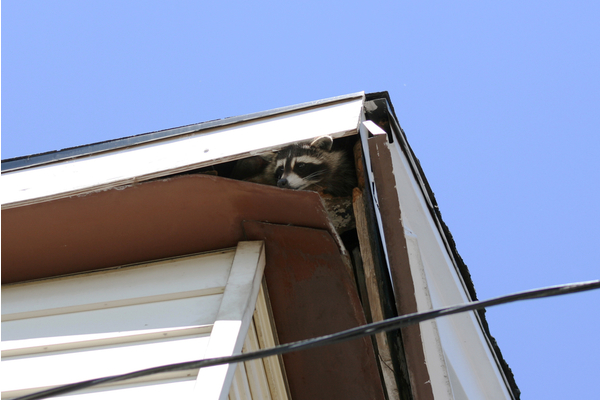Does it sound like there’s a party in your attic? Scurrying or scampering noises are sure signs of rodents or other animals loose up there. Terminix has removal tips.

If you're looking for how to get rid of pests in your attic, you've taken the proper first step. Squirrels, raccoons and rodents can carry disease and chew through your wiring, creating a fire hazard. Keeping these animals out of your attic is the best approach. Take steps to correct the conditions that attract critters in the first place. If you still wind up with wildlife in your attic, here’s how to safely and humanely get rid of animals in your attic.
Signs Animals are in Your Attic
- Droppings or urine
- Nests made of paper, leaves and twigs (squirrels, rodents, birds)
- Disturbed insulation (squirrels and raccoons); if pests have nested in or destroyed your insulation, you may need to replace it
- Ducts ripped apart (raccoons)
What do animals in your attic sound like? You may hear one or more of these pest noises coming from upstairs:
- Gnawing or squeaking at night (rats)
- Scampering or scurrying noises (squirrels or rodents)
- Purrs, whimpers, snarls, growls, hisses, screams and whinnies (raccoons)
How to Safely Get Rid of Animals in Your Attic
Don’t panic. The raccoon or possum accidentally wandered into your home and is probably looking for a way out.
Keep your distance. Keep children and pets away from the animal to prevent bites. Squirrels, skunks and raccoons can carry rabies, so it’s important to avoid contact with them. These animals are dangerous and will defend themselves by biting or scratching if trapped or threatened.
Let the animals leave on their own. Open doors and windows and turn on the lights. Don’t block their exit. If you’ve had contact with the animal, call Terminix® to remove the animal and assess your level of risk for disease exposure.
Block their re-entry if you are sure all animals are gone. After the animal is gone, repair the damage to keep other animals from entering your attic. Regularly inspect your home for rotting wood, holes or other weak spots that provide access.
Tips for Removing Animals Commonly Found in Your Attic
How to Get Rid of Mice or Rats in Your Attic
Roof rats (aka black rats) often build nests in attics. Because they need water daily, they tend to nest where water is readily accessible. The best way to get rid of rats and mice is to use the classic wooden snap traps or bait traps. The most effective rodent control requires an integrated approach that includes rodenticide, rodent proofing, harborage reduction, trapping and increased attention to sanitation. For the most comprehensive rodent removal solution, call a Terminix pest management professional. Attic rodent removal costs will vary depending on your unique situation, but you can get started with a free inspection.
How to Get Rid of Squirrels in Your Attic
Scampering noises and missing insulation near the eaves are signs of squirrels. Locate the entry points (usually soffit or roof vents and eave gaps). Use steel mesh to seal the entry holes, but leave the main entry/exit hole open. Install a one-way squirrel exclusion door at the opening so squirrels can leave but not return. The squirrels should leave within a couple days. When you no longer hear scurrying noises in your attic, you’ll know they’ve left. Remove the exclusion door and seal the main entry hole with steel mesh. Traps in the attic rarely work. You could put traps on the roof near the entry point, but you may not catch them all.
How to Get Rid of Raccoons in your Attic
Raccoons can enter your attic through loose shingles and/or openings, the roof and eaves. Raccoons are capable of ripping shingles off and chewing holes in buildings. By turning on bright lights and a radio, you can make your attic an unpleasant environment to encourage raccoons to leave on their own.
To determine whether raccoons are using a suspected entry hole, stuff rags or bunched up paper in the holes and check to see if they’ve been disturbed. Use an exclusion device called a one-way door, which acts like a tunnel or doorway through which raccoons and other rodents can pass but not return. The raccoons travel through the one-way door to get out and cannot use that same point to re-enter. Don’t use a one-way door when babies may be present unless the babies are mobile. Be sure all raccoons have moved out before you seal their entry opening, especially between March and July, when there may be babies.
How to Get Rid of Possums in Your Attic
Possums are excellent climbers and often live in attics. They are smelly creatures and their droppings make quite a mess in your attic. The only way to remove possums from your attic is via trapping and removal. It may be illegal to trap and relocate possums in your state, but Terminix can help you fully understand what your specific options are.
How to Get Rid of Pigeons in Your Attic
Pigeons may enter your attic through damaged eaves, broken vents or attic windows. If you have a window in your attic, open it and shoo the bird out. If you don’t have a window, you may have to wait for the bird to leave on its own. After the pigeon leaves, repair the damaged area that allowed the pigeon to enter in the first place. It may be illegal to remove any bird eggs you find, so consult Terminix on what you should do. It is also beneficial to contact Terminix for positive bird identification, as any species of bird may find its way into your attic.
Call a wildlife removal specialist. Trapping and removing wildlife from your attic isn’t easy, and neither is climbing onto your roof carrying a trap. Your wildlife removal specialist knows how to safely get rid of animals in your attic.




